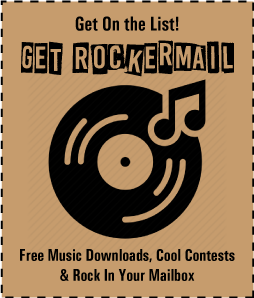Paul: What do they say, “Necessity is the Mother of Invention?” I booked the tour, that was my job. I used to go to a pay phone, and we didn’t have any money, so I came up with this system where I’d call an operator and say, “How much is it to call Chicago?” and they’d say, “It’s two dollars and 20 cents for the first three minutes.” I’d hang up and call up again with the number of some club I wanted to call in Chicago, and I would say to the operator, “I was talking to Chicago, I just got kicked off,” and they’d say, “So how much did you put in?” and I’d say, “Two dollars and 20 cents,” so they’d assume, if I had the right figure, that it was real, and she’d reconnect me, so I had to do everything within three minutes, I had to get the whole spiel across, and we did it, booked a whole tour on a dime. In fact, people would tell me that some of these clubs got calls from the phone company. This was also when there was one phone company, it was AT&T or whatever it was, and they said, “Have you heard of this guy, Paul Collins, we’re trying to find him,” because I racked up thousands of dollars worth of these illicit phone calls.
There was a fledgling network of places, and we had a few key dates. One of them was here (in Boston), we did four days at The Rat (RIP – Ed), four days at Max’s Kansas City, which nowadays, it almost sounds unbelievable, that we could get four days. Granted, our guarantee that we were asking for was 80 dollars a night, which we could get, which today is actually hard. I booked a lot of it on the road. When we got to Denver, we had huge gaps and people came out of the woodwork to help us. When we played in Cleveland, Pere Ubu came out and they helped us. I met Danny Fields in New York and he gave us some shows with the Ramones. It was an exciting time, because it was just when this whole thing was starting to happen. In fact, when we played Cleveland, we played this place in the Flats, Pirate’s Cove, we played with Devo there, and I remember, the night we got there was the night that Time magazine had come out with Johnny Rotten or punk rock on the cover. The lead singer of the Dead Boys, Stiv Bators was at the show, and he had a copy and was going, “My picture’s bigger than Johnny Rotten’s, fuck this shit, we’re going to fucking rule!”
Obviously, we had no idea what we were doing, and I wish we had enjoyed it more than we did, because it was such a hustle, and it was so much…we were constantly trying to get things together. But we did it, and it was really the first national tour. We said, “If we’re going to do this, we’re going to go coast to coast,” and we did 16, 17 major cities. I did a diary of it, and I kept it, and I remember we came home completely broke, but we did it, and it was something. And a lot of bands saw that tour, when we played New York, people from Patti Smith were there, Blondie were there, we played with Suicide, I think we played Detroit and the Romantics were there. I know the Knack saw us in L.A. We had no idea what we were doing, but we were setting a standard for what would come, and I’m very proud of that.
Rocker: Do you feel that you have touring down to a science at this point?
Paul: Sometimes it’s exhausting, and I make sure I do it right, because I’m not 18 anymore, and I need to…basically, I need to eat right and sleep right, and I do. I think I’m getting the DIY thing down to a science. Now, most of the time, for example, we’re doing a west coast tour, I know ever night where I’m going to be, I’m going to be at people’s houses, and I know the bed I’m going to be in, I know the people I’m going to be staying with, and every once in a while, it all craps out, and you say, “OK,” and you live out of your car and go to a hotel. For me, I really love what I’m doing, and I want to do the best job I can, and in order for me to do that, I have to be rested. But in general, it’s good. I’m lucky, because I get the bed, if there’s only one bed, I’m getting that bed, and all the people I work with are really sweet and understanding.
Rocker: Was it the strength of the tour with The Nerves that convinced somebody to sign you?
Paul: No, we didn’t get signed, we broke up! We got back to L.A. and we’d done everything humanly possible. In those days, you really wanted to get on a label with a manager and agent and producer, and we couldn’t do it. Then about six months after the band broke up is when Blondie came out with [a cover of The Nerves’] Hanging on the Telephone, which just blew my mind completely.
After a short interim of floundering around L.A., feeling like my life was over, I got together with Steve Huff and we put together the Beat, and things went very, very quickly. Eddie Money, of all people, someone I’d met when I was in the Nerves, kind of really championed us and got us with his producer, who loved us, got us signed to Bill Graham Management, then subsequently Columbia Records, and then things went very, very quickly, and we went from being street urchins to being signed to one of the biggest labels in the world.
Rocker: I listened to an interview where you’re talking about how when grunge music came along the entire landscape of pop music changed…
Paul: It obliterated it. Not just power pop, but everything, blues, jazz, everything. That’s the way our country works, unfortunately, sometimes. Denny’s and McDonald’s… We had breakfast in a diner today in New Haven, a real diner. How often do you see a real diner? What’s up with that?
I just think that there’s a lot of great music out there. When I’m at home, I listen to all kinds of music, sometimes I listen to classical music, because I love classical music, I have a 17-year-old kid who puts on Top 40 radio, and I listen to it. The one great thing about the internet and the technological world we live in is that it’s very apparent that there’s room for a lot of things, and that’s our culture, and all these things should be enjoyed and protected. The thing in the United States that if it doesn’t make money it doesn’t exist, that’s bullshit. If you were to take out all the art, the music, the dance, the theater, the paintings, the sculpture, the ceramics, just because they don’t make money, you would have a very black and white world to live in.
I work pretty much exclusively with new and up and coming bands, and for me, it’s fantastic, and their fans, the people that come to shows, just in general now, it’s a completely different attitude, and I’m happy about that, because I don’t want to work in that other attitude. I started outside the business, and I’m still kind of completely outside the business, although I am fortunate enough to have recognition from legitimate press and radio and stuff like that, but every time I try to get involved with the “real” music business world, it’s like, “Yeah, right, what was I thinking?” Then I come back to what I’m doing now, which is great, we hang out with people who love music the bands are all really a lot of fun, and I think at this point, a lot of people do this because that’s what they love to do, like record store owners and fanzines, this is what we love to do, this is the world we’ve created for ourselves, and it’s great. Some days you make good money, some days you don’t make any money, some days it’s tough, but at least you’re not operating alone in a vacuum, you have a group of people that you’re with and it’s great.
Rocker: When you think about the career that you have now, do you feel satisfied?
Paul: I started out as a fan, I was listening to the radio and saying, “Man, if I could do this, that would be the shit,” so I consider myself really lucky, and it’s easy to let your ego get the best of you and get all bent out of shape or whatever, you think you’re god’s gift to mankind, but I really try to remind myself continually that, A: I’m really lucky to be able to do what I do. I basically came at this with no background whatsoever, I really wanted to do it, I was a kid who loved rock and roll, and I also consider myself very lucky and fortunate that the music that I’ve been a part of, with The Nerves and The Beat and what I’m doing now.
I’m really proud of my last record. I write these songs and sometimes it feels like I’m channeling, like I’m just there at the right time, right place. Thank god I can get up onstage at 55 years old and I can play “Rock and Roll Girl” tonight and it’s not going to be ridiculous, it’s not going to be some old guy trying to fit into his jeans from when he was 18. I’m proud of that, it’s really good, it’s solid, and that’s what I learned in The Nerves. We had such a high level of criteria, our ethic and what we were aspiring to, the elements of music and the mechanics that we put into writing songs, was really, really great, just classic, and if you stick to the classics, they never go out of style. We always try to stay within that framework, which is very, very difficult, even today. I look back at some of the stuff and say, “Damn, we were lucky to pull that shit out without screwing it up by doing something like being too cute or this or that or being too gimmicky. ” Just staying right in that very narrow margin is hard to do, and that’s the challenge for me, and that’s why tonight when I play “Come On, Let’s Go,” I know that’s a great song, simple, three chords. It’s like, “Damn, man, you pulled it out of the bag one more time,” and that’s my challenge, and it’s very difficult to do, and I don’t say that like I have thousands of them, I’m very lucky to have the ones that I have, and I really appreciate them.
[/et_pb_text][/et_pb_column]




Pingback: Rocker Magazine Tour Listings | Rocker: The Lifestyle Magazine for Mature Hipsters()